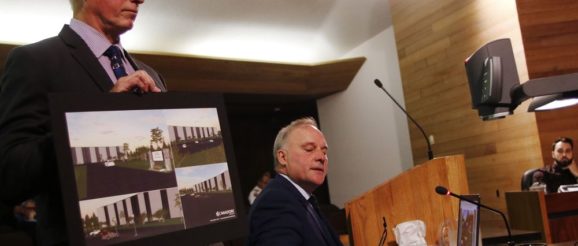Proposed ‘innovation park’ near Canadore moves through city hall | North Bay Nugget

A committee of North Bay city council is recommending that a 164-acre lot off Cedar Heights Drive be rezoned to allow for the proposed development of a new research park led in part by Canadore College.
The recommendation was made during a special meeting Tuesday of the city’s community services committee and detailed partially in a report to council from the planning and building department.
The exact nature of the proposed development wasn’t known prior to the start of the meeting.
But in a presentation to council Paul Goodrich, an Ontario land surveyor and land-use planner with Goodrich Goulet Planning & Surveying Ltd., and Canadore College president George Burton shed additional light on their plans for the property, which already has interest from five companies, all of whom have a connection to the college, and the potential to create upwards of 370 jobs.
“So that’s quite exciting,” Burton told reporters outside of the council chambers at city hall.
He said the “innovation” park will bring new jobs and industry to the city and help diversify the economy, all of which he described as only the second most exciting part of the proposal.
“The most exciting piece is that they’re supporting our program development, our research agenda and providing experiential learning opportunities for our students, so it’s a win-win-win all around.”
The five companies interested in locating at the park include the manufacturer of solar-powered grow pods announced in North Bay in June, a specialized lighting and lighting research company, a movie studio, a recently announced pharmaceutical plant, and a packaging firm that will service the plant and the agricultural-related activities of the park.
The plan would see the property leased to any interested companies initially before providing them the option of purchasing those pieces themselves.
The land itself is owned jointly between Canadore College and Millford Development Ltd.
Goodrich Goulet Planning & Surveying, meanwhile, made the rezoning application on behalf of Millford Development.
The property is currently vacant and undeveloped, according to the staff report to council, and is predominantly forested, although the southernmost portion of the land is partially cleared.
The surrounding land is largely residential, with Nipissing University and College College located just southwest of the subject property.
The property does not have access to municipal water and sewer services, the laying of which would be covered at Millford’s expense.
A standpipe recently built along Larocque Road also could be used to service the property.
The application to rezone would see the land changed from a residential designation to a form of industrial zoning, with special permission granted for post-secondary institutions.
Staff also asked that a holding zone be attached — requiring that specific mitigation measures be added to a site plan control agreement, which is needed before a building permit can be issued; a species at risk evaluation; traffic study; and a site servicing agreement for water and sewer — before development can occur.
Senior planner Peter Carello said because the scope of the development is not known, determining what mitigation is needed would be impossible.
He added that the developer would not be able to occupy any building until it is serviced in the event of a fire.
Due to the property’s vicinity to Highway 11 North, the developer would also need a land-use permit from the Ministry of Transportation of Ontario (MTO), which is planning to build an interchange near Cedar Heights Drive.
However, he noted that the holding zone could be removed within a month once a site servicing agreement is entered into, even without any physical infrastructure built, while the traffic study could be done while a land-use permit application is made to the MTO.
Goodrich and Burton argued that the holding zone was a bureaucratic hurdle that would be covered under a site plan control agreement, and should be removed.
“It’s not a show stopper,” Burton told reporters. “I didn’t want to leave that impression. It, again to our presentation, it’s just one more hurdle that we’d have to cross and we question whether it’s necessary or not.”
Some councillors also questioned why the development wasn’t being proposed for the Airport Industrial Business Park, to which Goodrich and Burton explained that the interested companies are vibration sensitive and would be impacted by the heavy machinery and plane landings at the airport.
Former city councillor Peter Handley wrote to the city as a member of the public endorsing parts of the proposal, although he felt the educational component should be mandatory as part of the rezoning process.
“All I wanted to do was have them put in they have to do it,” he told reporters. “Education has to be part of that development and right now it’s not there.”
